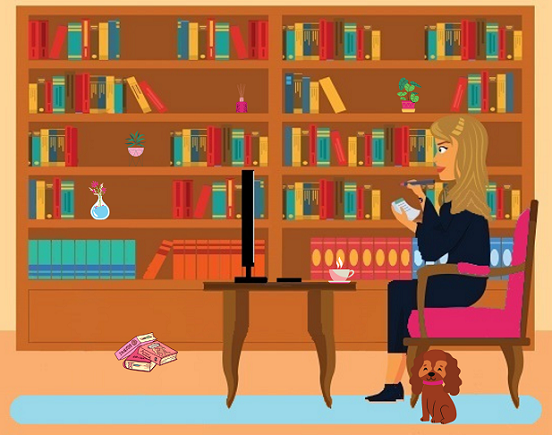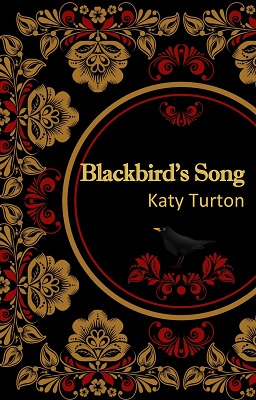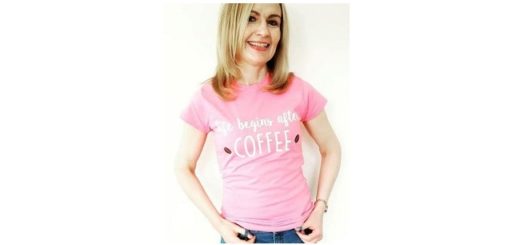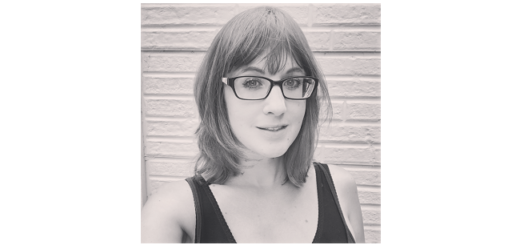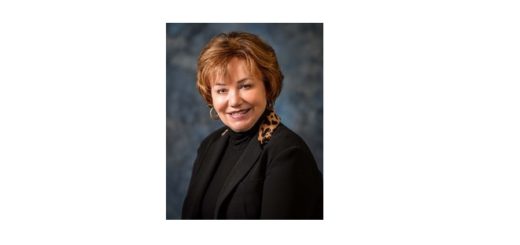The Writing Life of: Katy Turton
Katy Turton
This week I am thrilled to be interviewing author Katy Turton, who will be sharing with us details of her writing life, telling us all about her new book ‘Blackbird’s Song‘, which was released on 30th April 2021, and answering a few fun questions. This post contains affiliate links.
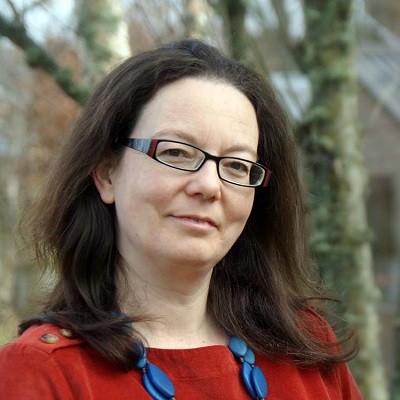
Katy Turton is a Russian historian who has worked at the University of York and Queen’s University, Belfast. She now teaches at the University of the Highlands and Islands. She has spent many an hour in the archives and libraries of Moscow and St Petersburg and has published widely on the role of women and family in the Russian revolutionary movement, including Forgotten Lives (2007) which centres on Lenin’s sisters and Family Networks in the Russian Revolutionary Movement (2018). She lives in the Cairngorms National Park with her husband and two sons.
1) Did you enjoy writing when you were a child?
I did enjoy writing as a child. I wrote poetry and tried my hand at a couple of sci-fi/fantasy stories – though I never finished them! Unfortunately, my fiction writing stopped when I went to university. Although I studied English literature, my brain seemed to close the door on fiction writing and became totally consumed with academic writing.
2) Which author shaped your childhood?
I read very widely as a child. I particularly loved Rosemary Sutcliffe’s novels, though I’ve never actually read her most famous work, The Eagle of the Ninth. My favourite was Warrior Scarlet. I read a lot of classic science fiction like Jules Verne’s Journey to the Centre of the Earth and H. G. Wells’ The Invisible Man, and I loved Ursula Le Guin’s Earthsea trilogy. Later I discovered Margaret Atwood and Susan Hill. I found Hill’s In the Springtime of the Year and Strange Meeting absolutely mesmerising.
3) What motivated you to begin your first novel?
A confluence of events got me started on my first novel: I was leaving my job at Queen’s University (I had a young family and was commuting back and forth between Scotland and Belfast. It was not sustainable in many senses of the word); I read about how Diana Gabaldon got started writing Outlander – she decided to write a practice novel to see if she could do it; and a scene popped into my head of a woman being locked into a prison cell and uttering the phrase ‘Bozhe moi’ – my God.
My brain re-opened the fiction-writing door and I began to write Blackbird’s Song. Funnily enough, though, a seed for my novel was planted much longer ago. I wrote my PhD thesis on Lenin’s sisters and a good friend of mine mused that it would make a good novel.
4) Do you plot your book, or are you a pantser?
I definitely did not plot Blackbird’s Song. It sounds trite, I know, but the story came to me in regular instalments of inspiration and all I had to do was write it down. It certainly helped to have a good knowledge of the chronology of historical events which framed my story, since the story arrived in my head in random jigsaw pieces, rather than in a logical progression.
I feel I should add that now that I am writing the sequel to Blackbird’s Song, I have had to do a lot more active plotting. And it has been quite tricky in places!
5) What is your average writing day?
I do not have an average writing day. When I wrote Blackbird’s Song I tended to be on the move. A scene would come to me and I would have to write it down wherever I was. I wrote sections at the school gates on my mobile phone, I wrote one section in a park in Budapest when I was there attending a conference, and I often wrote on the plane between Belfast and Inverness. I have lots of academic journal articles that I printed out to read on the plane which have scribbles up and down every margin where I wrote down the scene I was thinking of.
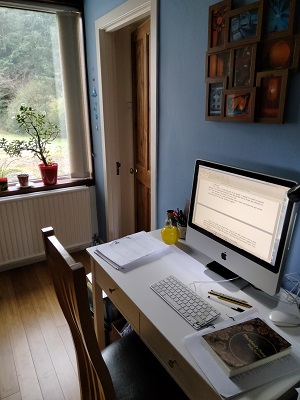
Where Katy Turton Writes
6) What is the best thing about being an author?
For me there are two things: I find the writing process utterly immersive and I love being whisked off to a fictional world. I have also really enjoyed the social side of being an author: I’ve met so many other fantastic writers and have really enjoyed the various book events I’ve been part of, either in person or on Zoom.
Publisher – Stairwell Books
Pages – 364
Release Date – 30th April 2021
ISBN 13 – 978-1913432256
Format – Paperback
Synopsis
Set against the Russian Revolution of 1905, a prelude to that of 1917, this novel explores the complexity of relationships and motivations that lead to acts of rebellion.
Tsarist Russia, 1904: a time of war, shortages, and popular unrest. Anna enrols at university and is befriended by twins, Rosa and Boris, who draw her into the revolutionary movement. As Anna finds new purpose to her life and falls in love, the violent struggle against the Tsar escalates. On 9 January 1905, a workers’ protest is massacred by Tsarist soldiers, with tragic results for the three friends. Now Anna must continue the revolutionary struggle, knowing that to do so will mean sacrificing everything she holds dear.
The novel reflects the reality of the Russian and other revolutions where women played a full part.
Purchase Online From:
7) How did you go about researching the content for your book?
The research for my novel was mostly done in advance since Blackbird’s Song is based entirely on my academic specialism – late Imperial and early revolutionary Russia. Having said that, I did have to find out lots of things that my academic research could not help me with like where did people go to dine out in St Petersburg, how did Russians decorate their homes, what did people wear?
There is a wealth of historical information online these days and I worked my way through lots of English and Russian language websites. Google maps is terrifically helpful to work out how long it would take people to walk round cities, though I also used lots of old maps and old photographs to get a good sense of what Russia looked like in the early 1900s. I have also visited St Petersburg and Moscow which are both backdrops to action in my novel.
8) How long did it take to go from the ideas stage to writing the last word?
I began writing as soon as I had my first idea. It took me roughly a year to write the first draft, but two more to redraft and revise it about a million times!
9) What made you choose the genre you write in?
I followed the Jane Austen approach – write what you know. I had been researching the lives of revolutionary women for twelve years, had held their letters in my hands in the archives, had read their memoirs, and seen photographs of them, so I felt I knew this subject better than any other I might base a novel on.
10) How did you come up with the name(s) for your lead character(s)?
There was always going to be a Rosa in my book. I have two sons, but Rosa was the name we had lined up if we had a girl. So, I thought I’d put it to use in Blackbird’s Songs. Other than that one, I used a range of methods: sometimes I borrowed the names of Russian people I had met; at other times, I looked into the meanings of Russian names so that the name matched the character’s personality.
11) Can you give us an insight into your characters?
There are three characters at the heart of my book: twins Boris and Rosa, and Anna. Boris is the pragmatist, Rosa the optimist, and Anna the romantic. Beyond that the key thing for me is that they are students. I can remember vividly what being a student felt like: you felt like you knew everything about the world, you felt immortal and that anything was possible, and you believed above all that you knew how the world should be changed to make it better.
Young people with that kind of outlook were inevitably drawn into a revolutionary movement that seemed good and just, hopeful and adventurous. What the characters then have to learn is that the world can be a very hard place and that there is always a cost when you join a revolutionary struggle.
12) How did you feel when you had completed your book?
Having published a couple of monographs as an academic I was very aware that you haven’t completed your book until you unpack the printed copies! In that situation I was lucky as I always had a contract in advance for the book I was writing. With my novel, I quickly learned what a roller-coaster of emotion follows the ‘completion’ of the book because then the submission process begins – there’s hope when you submit, tension as you wait for a reply, disappointment when you get a rejection, then back to hope.
I was elated when my lovely publishers, Stairwell Books, offered me a contract and giddy when I finally held my book in my hand! Then, of course, a new stage of the journey begins: promoting your book… And it’s back to hope, tension, and so on…
Fun Questions
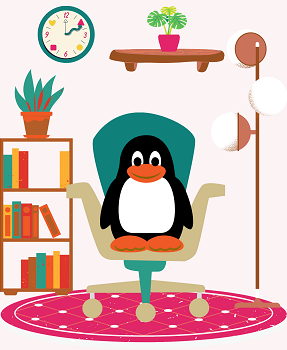
1) Do you have a favourite quote?
I don’t have a favourite quote as such, but I suppose I live by three values or ideas: get on and do the stuff you want to do, be honest, and be kind.
2) Do you have any pets?
I don’t have any pets. I collect apples (wooden, glass, stone etc) in honour of the place my husband and I got married: Applecross, on the West coast of Scotland (see photo).
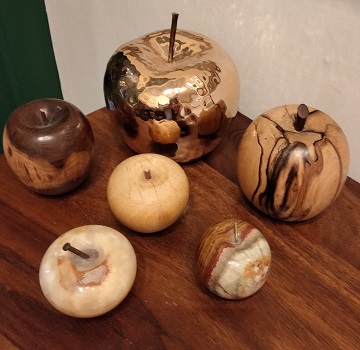
3) What are you currently reading?
This year I’ve met lots of other debut novelists and the great thing about that is that you get a ready-made list of books to read and enjoy. It would be unfair to single anyone out, but those who are interested should check out my Twitter account for the authors I mean.
On top of that, are:
Natasha Pulley’s The Kingdoms. To me, her books are the perfect blend of magical realism and historical fiction.
Diana Gabaldon’s Go Tell the Bees I’m Gone. Actually I’ve already read it, but am reading it again just now!
4) Your book has been made into a movie, you’ve been offered a cameo role, what will you be doing?
I’d be marching in protest against the Tsar on Bloody Sunday, 9 January 1905, (the central crisis of Blackbird’s Song) just to the left of Boris, Rosa and Anna.
5) If you could travel to a fictional world from any book for the day, which would you choose?
I’d go to the fantastical village of Bedlam, in Peru, in Natasha Pulley’s Bedlam Stacks.
6) There’s a penguin sitting in your chair, what’s the first thing he says to you?
‘Stop faffing and get writing!’ (Despite my mantra of getting on with things, I’m a terrible procrastinator when I sit down at my desk to write).
A big thank you to Katy Turton for sharing her writing life with us and a wonderful interview.
Author links
Goodreads

